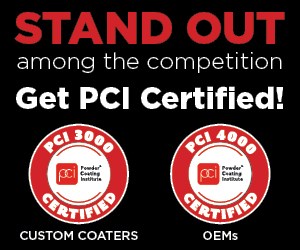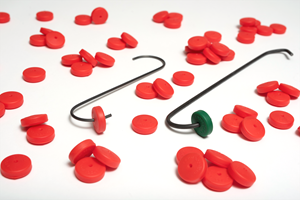Seeing Inside Nooks and Crannies for Auto Corrosion Protection
Fischer Technologies (Windsor, CT), a manufacturer of coating thickness, material testing and material analysis instrumentation, has introduced a new, non-destructive flexible probe which they say can get inside normally inaccessible cavities to get measurements.
Most automobiles are provided a corrosion protection by a cathodic dip priming method, but that usually means OEMs have to trust their processes when they can’t get inside girders, stiffeners or cross beams to measure coatings.
But Fischer Technology, Inc. (Windsor, CT), a manufacturer of coating thickness, material testing and material analysis instrumentation, has introduced a new, non-destructive flexible probe which they say can get inside normally inaccessible cavities to get measurements.
The new V3FGA06H probe was specifically designed for the automotive industry. It has a curved shape and a small, flexible probe head that fits through small openings in the car body to measure coating thickness at areas which were tough to reach up to now.
Flexible and Smart
“Because of the flexible probe head’s smart kinematics, a precise placing and measurement is guaranteed, whether in blind mode or on beveled areas,” says Fischer’s Paul Lomax.
Fischer says the new probe is suited for measurement of cataphoretic painting typically thinner then 20 μm, including zinc coating.
“We’ve improved measurements on curved walls because of the free-moving angle of the probe head,” Lomax says. “And it also avoids scratching the coatings because of the lack of sharp edges on the plastic probe head.”
The new probe can measure defined distance from the insert hole up to 170mm. The minimum diameter of the hole is 14mm (or 15mm with a backstop) or 12mm with a slot hole.
The probe head has three points, so it can automatically find the correct position.
Lomax says: “This leads to excellent reproducibility and repeatability.”
The new cavity probe is compatible with Fischer’s FMP magnetic induction gauges, along with its Dualscope 100 for more heavy-duty use.
Non-Destructive Measures
The FMP Series is a hand-held instrument to measure coating thicknesses non-destructively. It uses a magnetic induction method or eddy current, and some devices use both methods.
Fischer’s FMP models are good for repetitive measuring applications that get lots of use and wear. The FMP30 and FMP40 feature various adjustments for structured data collection, more memory and are Bluetooth-data transfer capable, making them more suited for complex measuring applications.
Fischer’s most advanced model in the FMP family, the Dualscope FMP100, has a user-friendly operation and a high-resolution color touch screen that uses the Windows CE operating system. It also uses magnetic induction and eddy current measuring methods, and specific settings and calibrations can be stored and recalled later.
In addition to extensive evaluation and statistics functions, the FMP100 offers a graphical presentation of the measurement data through the use of its integrated FDD software package.
Fischer has products such as the Feritscope FMP30 for the measurement of ferrite content in austenitic and duplex steel. Other Fischer products include the Phascope PMP10 for measurements according to the phase-sensitive eddy current method; Phascope Duplex to measure individual thickness values of paint/zinc/steel coating in automotive and appliance settings; the SR-Scope RMP30 to measure copper coatings on computer- boards; Sigmascope SMP10 to measure electrical conductivity of metals such as aluminum or copper; the Anotest YMP30-S for testing the sealing quality of anodic coatings on aluminum to measure its weather resistance; the Fischerscope HM2000 and Picodentor HM500 to determine the Martens Hardness in the micro- and nano-ranges; and the universal measurement system Fischerscope MMS designed for coating thickness and materials testing according to the magnetic, magnetic induction, eddy current, beta backscatter and electrical resistance measuring methods.
Probe Workhorses
The real workhorses are the extensive high quality probes Fischer offers. While the probe supplies the actual measurement signal, the quality of the measurement is contingent on the correct probe selection for the application. Fischer offers several hundred varieties for different applications in coating thickness measurement and material testing.
Its magnetic induction measuring probes comes in four models, with a measuring range from 0–2,000 µm for electroplated coatings or paint and lacquer coatings. These are mostly used for measurements in bore holes, pipes or grooves applications, and some models have a two-tip probe for greater repeatability precision on rough surfaces, allowing for more reliable positioning and constant pressure force, even on soft coatings.
Fischer’s eddy current probes are suited for paint, lacquer or plastic coatings on non-ferromagnetic metal substrate materials. One model has an angle probe for measurements on flat specimens or in pipes, bore holes and interim spaces.
The company’s dual probes for measuring both magnetic induction and eddy current methods switch automatically to the appropriate method and are used for the measurement of single coating thicknesses. Paint/zinc on steel sheet or on steel structures are measured with the duplex probe. It is also possible to measure hot-dip galvanized coatings (Zn ≥ 70 μm) with diffusion zones. n
To learn more about Fischer Technology, please call 860-683-0781, or visit fischer-technology.com.
Related Content
CFS Unveils New Hook Locks Parts Racking Solution
New product from Custom Fabricating & Supplies (CFS) prevents part loss during coating processes.
Read MoreMasking Solutions Provider CFS Dramatically Expands Capabilities and Capacity
Custom Fabrication & Supplies (CFS) completed a new plant expansion packing 10 times the capacity into twice the space. It dramatically enhances the supplier’s custom capabilities to provide extremely precise and cost-effective masking solutions.
Read MoreAn Altruistic Growth Strategy Puts People First
Professional Plating emphasizes investing in its team and fostering a supportive environment on the shop floor.
Read MoreSustainability, Electrification and Mobility
Industry events like ECOAT are good indicators of the trends that are top of mind for those in manufacturing.
Read MoreRead Next
Episode 45: An Interview with Chandler Mancuso, MacDermid Envio Solutions
Chandler Mancuso, technical director with MacDermid Envio discusses updating your wastewater treatment system and implementing materials recycling solutions to increase efficiencies, control costs and reduce environmental impact.
Read MoreDelivering Increased Benefits to Greenhouse Films
Baystar's Borstar technology is helping customers deliver better, more reliable production methods to greenhouse agriculture.
Read MoreA ‘Clean’ Agenda Offers Unique Presentations in Chicago
The 2024 Parts Cleaning Conference, co-located with the International Manufacturing Technology Show, includes presentations by several speakers who are new to the conference and topics that have not been covered in past editions of this event.
Read More





















